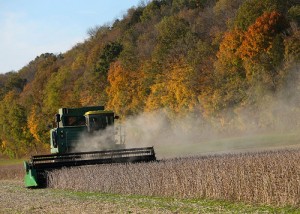Regular equipment checks urged to prevent combine engine fires during harvest season
Posted on Sep 24, 2015Louisville, KY (September 21, 2015) – As the seasonal harvest of row crops gets into full swing across the state, Kentucky Farm Bureau (KFB) reminds farm workers to keep their combine engines clear and well-maintained before firing them up and heading out to the field. Combine engine fires, while usually avoidable with regular upkeep and cleaning of these essential machines, are both dangerous and expensive.
 The risk of combine fires typically increases in drier conditions, during warmer afternoon temperatures and under the day-long accumulation of crop residue from harvesting. Across the nation combine and tractor fires have been estimated to cause up to $20 million in property damage annually, plus millions of dollars more in lost labor time and crop loss. Even more concerning is that nearly 50 people a year are injured during these fires, occasionally resulting in death.
The risk of combine fires typically increases in drier conditions, during warmer afternoon temperatures and under the day-long accumulation of crop residue from harvesting. Across the nation combine and tractor fires have been estimated to cause up to $20 million in property damage annually, plus millions of dollars more in lost labor time and crop loss. Even more concerning is that nearly 50 people a year are injured during these fires, occasionally resulting in death.
Before taking a combine out for a long day’s work of harvesting crops this fall, operators must be sure to:
Have a clean machine. Approximately 75% of all equipment fires start in the engine compartment, so keeping a combine’s engine clear and clean of dust, plant residue, trash and other flammable material is crucial. This area should be cleaned at least daily, but more frequent attention may be required during periods of heavy use. Compressed air can be used to blow out dust and chaff, and a high-powered pressure washer can blast away grease, oil, fuel spills and other flammable residues. Keeping the engine clean also allows it to run cooler and more efficiently, further reducing the risk of a fire igniting from excess heat build-up.
Be diligent about daily inspections and maintenance. Timing is everything when it comes to farming activities, but skipping the daily inspection, cleaning and maintenance of equipment like a combine when in heavy use isn’t worth the associated risks just to get back in the field sooner. Carefully examine wiring, fuel lines, hoses, belts, fittings and bearings to identify worn parts, leaks, cracks or other damage that can lead to a breakdown or, worse yet, fire. Replace or repair any parts that don’t pass inspection and follow the manufacturer’s recommended schedule for lubrication and maintenance.
Go to the source of the heat. While combine fires can be sparked by a variety of heat sources, keep a close eye on the parts that are naturally hot – like the engine, exhaust system and electrical connections – and ensure they are in top condition. In addition to engine fires, it is common for leaky or worn components like the manifold, muffler and turbocharger to run extra hot and ignite flammable materials they contact. Malfunctioning fuses, circuit breakers, wiring, switches and other electrical parts must also be addressed swiftly with the dealer or manufacturer. Arcing electricity between bad components or wires – especially if near flammable materials kicked up from the combine – can quickly start a fire.
Equip combines with a 10-pound ABC dry chemical fire extinguisher. Or better yet, two – one in the cab and another where it can be accessed from the ground. Despite following preventative measures, sometimes fires do still occur. Putting the fire out quickly is possible if extinguishers are mounted on the combine, but only after the engine has been turned off. Having a second fire extinguisher at the ready helps in case the first one malfunctions or has lost its pressure, and having them in dual locations ensures one is quickly available no matter where the fire originates.
In the event a fire does break out while operating a combine, and if the operator can continue to safely drive it without risk of personal injury, it should be steered toward a clear area to reduce the further risk of starting a field fire and losing crops in addition to equipment. Fire extinguishers can be used to put out the flames if possible, but only as the operator is able to do so safely. A cell phone or radio should also be used immediately to call for help, especially when operating in isolated locations. Local fire departments will respond quickly and help reduce the overall damage of the fire.
As Kentucky’s farmers seek to work quickly and efficiently while bringing in their crops during the long weeks ahead, regular inspections and maintenance of their combines and other equipment remain essential. Kentucky Farm Bureau urges everyone to keep personal safety and property damage reduction the number one priority this fall.
Tagged Post Topics Include: Accidents, Caution, Cleaning, Engine, Fire Extinguisher, Flammable, Harvest, Injury, Inspections, Maintenance, Safety, Seasonal, Trash, Combine
Comments